On Film

I’VE SPENT MOST of my life explaining to people why movies and TV shows are more than just a way to pass time. My favorite screen stories — serial or cinematic — help me connect with their creators or the depicted characters. Narratives help us make sense of our experiences and recognize ways we can help others consider their own. Jesus knew this when he told parables, using stories to communicate some of his most important teachings on how we should live generously and faithfully.
A sci-fi series about a robot who struggles to relate to human beings may seem an unlikely example of how good storytelling helps us walk through the world. But that’s what the Apple TV+ show Murderbot offers.
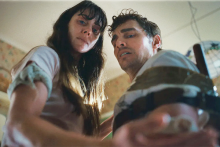
BY DESIGN, BODY horror is a genre that’s hard to stomach. It trades jump scares for lengthy exposure to imagery that gets stuck in both your mind and gut. These depictions of the degeneration or mutilation of the body offer embodied critiques of societal problems, like unrealistic beauty standards (The Substance) or online surveillance (Possessor), or, as is the case in Michael Shanks’ forthcoming film, Together, dysfunctional romance.
One moment in particular sticks out. In a scene from the first half of the film, we watch Tim (Dave Franco) and Millie (Alison Brie) kiss tenderly. But as the kiss ends, the couple finds that their lips have fused together. While Together features many gruesome scenes of Millie and Tim testing the adage of “till death do us part,” Shanks’ film has more on its mind than just grossing you out; it explores the dual discomforts of romantic complacency and romantic codependency.
Tim and Millie move to the remote countryside for Millie’s job at a small school. Tim, a musician, has felt creatively stuck and emotionally hollow. And while Millie is hopeful that the move might be a fresh start for their relationship, the transition is looking more like a continuation of moorage. Franco and Brie — who are married in real life — distinctively capture the complacency that can come in a long-term relationship.
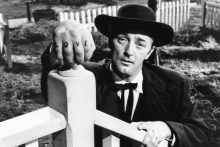
ECCLESIASTES 1:9 TELLS us “What has been is what will be, and what has been done is what will be done; there is nothing new under the sun.” I used to read that verse with a sense of existential fatigue, but as I’ve grown older, it reminds me that the struggles we face now are different forms of struggles as old as time itself. As hard as things might get, we’re never without hope that good will come back around, because it has before.
Examples of this exist in art as well as scripture. Take, for example, the 1955 film The Night of the Hunter, which addresses religious extremism, hypocrisy, and spiritual abuse. Director Charles Laughton’s dark and impressively modern approach to those ideas didn’t sit well with audiences at the time, but 70 years later, the film has only grown in influence.
Laughton’s film follows Harry Powell (Robert Mitchum), a Depression-era preacher who funds his “ministry” by marrying widows and killing them for their money. We watch Powell court, manipulate, and murder a guilt-stricken woman, Willa (Shelley Winters). Willa’s children, John (Billy Chapin) and Pearl (Sally Jane Bruce) escape Harry’s clutches and find refuge with Rachel (Lillian Gish), a kind woman who helps them recover from their trauma.
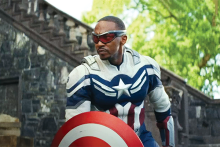
THE CAPTAIN AMERICAseries has always been a bright spot in the Marvel Cinematic Universe. Sure, they’re big blockbuster fun, but they’ve also been willing to do what political thrillers do best: Consider the questions of power. Previous entries have interrogated the perils of the surveillance state and the historic experimentation done on Black soldiers, political waters that few MCU projects have ventured into.
Which is why it’s such a shame that Captain America: Brave New World — hampered by reshoots, strikes, protests, and a tepid rollout amid Donald J. Trump’s reascendance to the presidency — offers only the veneer of substance.
When President Thaddeus “Thunderbolt” Ross (Harrison Ford) asks newly christened Captain America Sam Wilson (Anthony Mackie) to restart The Avengers, Wilson is apprehensive. Ross, a former military general, helped dismantle the team in Captain America: Civil War, imprisoning Wilson and other heroes. But when U.S. operatives attempt to assassinate Ross, Wilson must work with the increasingly untethered president to uncover who’s behind the plot.
A film about the tension between serving your country and serving your president, particularly in our current moment where paranoia and disunity reign, is rich with possibility. But instead of engaging these pertinent issues, the film seems to wave away concerns about the danger of political power, filling its runtime with clunky dialogue that alludes to complex ideas without engaging them, lest they reduce the film’s marketability.
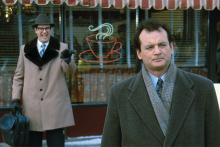
I’VE BEEN THINKING about the 1993 comedy Groundhog Day a lot since the beginning of the second Trump presidency. Like Bill Murray’s disgruntled TV weatherman Phil Connors, who’s forced to relive Feb. 2 on an unending loop, many of us feel like we’re reliving a nightmare. We find ourselves taking steps backward from progress we thought was permanent. Like Phil, we’re battling the feeling that no matter what we do, nothing will change.
However, being stuck in a moment you want to leave behind is only Groundhog Day’s setup, not its message. In a world where our individual actions don’t seem to change anything, Groundhog Day reminds me why helping others still matters.
When we meet Phil, he’s whining about making the annual trip from his station in Pittsburgh to Punxsutawney, Pa., to cover the groundhog festival. The trip is beneath him, he thinks. When a snowstorm strands Phil and the news team in Punxsutawney overnight, it seems like the ultimate insult — until Phil wakes up the next day and discovers he’s reliving events all over again. And again.

JEAN-LUC GODARD'S 1967 anti-consumerist film Weekend is difficult to explain in the space of a column, but a single scene offers a cross-section of its absurdity.
A bourgeois married couple begin a road trip to kill the wife’s parents and inherit their fortune. Naturally, once the deed is done, they each intend to kill the other and run off with their respective lovers. But first, they must maneuver traffic.
A country road is frozen in bumper-to-bumper traffic, and for nine excruciating and exhilarating minutes, the camera methodically tracks along the road, gawking at the jam. Some people play chess in the roadway while others toss bouncy balls between vehicles; children have emptied out of a school bus and run through the grass; there are lions, a llama, monkeys; people lounge and flirt as the couple weaves through the mess. The scene is made even more chaotic by the insatiable, mechanical wail of competing car horns and screaming squabbles.
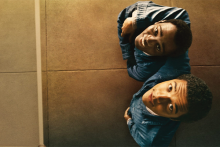
Trauma changes your memories. When I think of traumatic experiences in my life — what happened, how I felt before that moment, how I felt afterward, the changes I’ve noticed in myself since — they often play in short bursts. Those bursts are rarely sequential, and the length of time they last depends on how long I allow myself to linger on a memory.
Filmmaker RaMell Ross’ Nickel Boys, an adaptation of Colson Whitehead’s 2019 Pulitzer Prize-winning novel, is a record of trauma. It tells the story of two Black boys’ experience at an abusive reform academy in Jim Crow-era Florida. The fictional Nickel Academy is inspired by an actual place, Florida’s Dozier School for Boys, where students received brutal treatment at the hands of staff. A 2012 investigation by the University of South Florida uncovered dozens of human burial sites on the property.
Ross does something unique with this story about trauma, memory, and how they relate to each other: He makes it feel authentic.
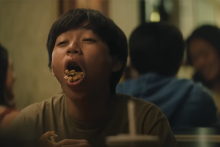
THERE IS SOMETHING horrendous about the politics of being 13 — the raging hormones, the prepubescent brinkmanship; nobody knows what they’re doing, and everyone wants you to think that they do. Such is the case for Chris Wang (played by Izaac Wang), aka Wang Wang, aka Dìdi, aka Half-Asian Chris (he’s not actually half-Asian). Chris is having a bit of an identity crisis.
Director Sean Wang’s Dìdi is a love letter to adolescence rendered with painstaking specificity, a period piece set in his own childhood home of Fremont, Calif., during the era of T9 texting and AOL instant messenger.
It’s the summer before freshman year in 2008 and Chris is getting into shenanigans: skating with his friends, wondering if he should send a :) or a ;) to his crush, and generally feeling emotions nobody else could possibly understand. Plus, his mother keeps arguing with his grandmother and asking if he’s feeling sad — so annoying. And his sister, who sucks, obviously, is leaving for college, but at least she has good taste in music (or rather, she likes the same music as Chris’ crush).
There is such frenetic volatility to early adolescence.

ONE WAY TO take a culture’s temperature at a given moment is to look at the art it produces. This is particularly true in film — a visual medium and a business largely driven by audiences’ perceived interests. Movies reflect their times, not just visually, but thematically.
Films made during the Great Depression, for example, included social realist dramas like Leo McCarey’s Make Way for Tomorrow, about an elderly couple who lose their home to foreclosure, and works of optimistic patriotism like Frank Capra’s Mr. Smith Goes to Washington, where Jimmy Stewart brings his determined charm to Capitol Hill. Others, like Capra’s romantic comedy It Happened One Night, offered troubled moviegoers good-natured escapism.
So, what’s on our minds recently, cinematically speaking? Among other things, a pandemic, corrupt institutions, international tragedies, and (another) contentious election year. There are many reasons viewers might want to escape into simpler or more fantastical worlds.
One recent trend, however, has surprised me: movies about presence.
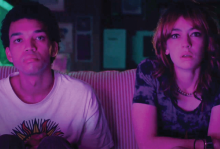
IT'S HARD TO understand what motivates Owen, in part because he is almost always alone. The lead in I Saw the TV Glow (played by Ian Foreman and later Justice Smith) is near-always inert, save for when it comes to his favorite television show: The Pink Opaque.
When the lonely seventh grader discovers that a disaffected girl two grades older than him, Maddy (Brigette Lundy-Paine), also stays up late to watch the monster of the week show, he sneaks out to watch it with her. It is one of the most radical acts he takes.
Set in an anonymous suburb in 1996, the two gather every Friday to watch the show, a Buffy the Vampire Slayer and Twin Peaks composite about supernaturally empowered teens who defend their suburban county against the evil Mr. Melancholy. Together they fall into the show’s immersive lore to escape their own hardships — an abusive stepfather, a chronically ill mother. As Maddy explains, the show “feels more real than real life.”

IN THE CLOSING scenes of Marvel’s original Guardians of the Galaxy, we find our heroes in a tight spot. The group — escaped science experiment Rocket Racoon, giant sentient tree Groot, assassin Gamora, ex-convict Drax, and mercenary Peter Quill — have been grudgingly working together to protect a powerful artifact from falling into the wrong hands. Because they’ve each been pursuing their own agendas instead of working together, they are close to failure. It’s up to Quill (Chris Pratt), to convince them to start working as a team.
“I look around at us, and you know what I see?” he asks them. “Losers.” Noting their incredulous faces, Quill qualifies, “I mean, like, folks who have lost stuff.” He’s right; each of these tentative allies have experienced loss, trauma, and unresolved grief that taught them not to trust others.
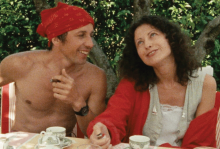
THERE IS SOMETHING outré about summertime sadness. As foliage reaches its lushest form and the sun turns our skin dewy, nature summons its full potential to evoke enchantment. And yet, we often find ourselves standing obstinate in the face of God’s good favor.
Such is the case for Delphine in Éric Rohmer’s 1986 French drama, The Green Ray. Newly separated from her fiancé and ditched by a friend she was supposed to vacation with, Delphine (Marie Ri-vière) is suddenly alone in Paris as the city’s leisure class flees for more temperate summer climates. Failed attempts at companionship find her isolated or, worse, at the mercy of dining companions who take on the role of Job’s friends, psychoanalyzing her disposition and insisting she just needs to get out more. Despite all efforts, Delphine is disenchanted.
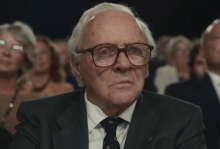
ONE OF MY favorite literary quotes comes from David Mitchell’s novel Cloud Atlas. When Adam Ewing, a 19th-century notary from California, decides to become an abolitionist and protest the transatlantic slave trade, he imagines his father-in-law declaring that Ewing is condemning himself to a meaningless life that will amount to nothing more than a drop in the ocean. Ewing responds, “Yet what is any ocean but a multitude of drops?”
I thought about that quote while watching One Life, a 2023 film based on the real life o fNicholas Winton, a British stockbroker who, in the year before World War II, rescuedmore than 600 Jewish refugee children in Prague by relocating them to England in what came to be called the Czech Kindertransport. Winton’s determination was indeed amazing, but as the drama shows, his efforts depended on many people who did what they could to help — many drops in an ocean of good.

THE REMAINING LISBON sister are sprawled in their bedroom when the priest knocks on their door.
“Hello girls, I thought we could talk. Do you feel like talking?”
Their returning stares are vacant and unknowable, and the priest wears only the pretense of concern. Both parties maintain their false decorum, neither fully able to acknowledge their shared grief: the suicide of Cecilia, the youngest Lisbon sister, only 13 years old.

IN THE GEN-Z romance XO, Kitty, Netflix platformed an uncommonly tender father-daughter exchange. “I have feelings for my friend Yuri, who’s a girl,” says Kitty, an American attending high school in Seoul, Korea. Speaking to her father across continents and generations, she’s visibly nervous to come out. He’s nervous too, but only because his daughter called him in the middle of the night. “Oh, thank God,” he exhales. Confused, she asks, “Thank God I’m bi? Or pan? Or fluid?” He smiles. “Whatever pan or fluid is, thank God you’re safe and healthy.”
I realize it’s doubtful the father is literally engaging the divine here — I don’t even know if he’s Christian — but I’ll take what I can get. Depictions of religious parents embracing their children’s queerness are rare. Christian coming-out stories are usually serious dramas, not binge-worthy rom-coms.
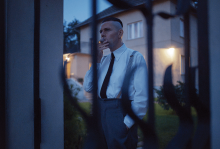
JONATHAN GLAZER’S FILMS aren’t really stories; they’re experiences. His work is moody and image-driven. Plot matters less than concept, which often makes his work feel like it should be viewed in an art museum rather than in a theater. This is certainly true of his latest, The Zone of Interest, a loose adaptation of a novel by Martin Amis.
Glazer’s film follows a Nazi commandant and his family who live next door to Auschwitz. Theirs is a disturbingly wholesome life — a study in what philosopher Hannah Arendt called the “banality of evil,” the bureaucratic just-following-orders mentality that allows evil to proliferate. As such, it’s also a timely film to consider in the context of rising authoritarianism around the world.

THE FIRST TIME we see Samuel Maleski (Samuel Theis), he is lying in the snow outside his home, blood pooling at his head. Across French director Justine Triet’s mystery Anatomy of a Fall, the cause of Samuel’s untimely death will be debated ad nauseam. Was it suicide? Or was it murder?
Samuel’s wife, Sandra (Sandra Hüller), a successful writer, becomes the state’s prime suspect, and his 11-year-old son Daniel (Milo Machado Graner), who has limited vision, is the only witness. Viewed through the lens of a whodunit courtroom procedural, one might expect the film to track the facts to a clear truth. But as lawyers and experts atomize the scene — a spatter of blood here, an open window there — a lack of physical evidence pushes the prosecution to lean on emotional appeals, building a case for murder around the circumstances of Samuel and Sandra’s flailing marriage.

IN 2018, 26-year-old American missionary John Allen Chau journeyed to the Andaman Islands in the Indian Ocean. He wanted to minister to the Sentinelese, the Indigenous residents of North Sentinel Island and one of the last population groups on the planet to have avoided modernization by the outside world. Chau, an Oral Roberts University graduate who grew up steeped in conservative evangelical culture, felt called to bring the gospel to unreached people.
The mission did not go as planned. Chau was quickly killed by the Sentinelese, who saw him as a threat. Chau’s death caused a public reevaluation of cross-cultural missions, one explored in the documentary The Mission. The film tells Chau’s story through his diary excerpts, his father Patrick’s account of Chau’s life, and expert interviews.
Directors Amanda McBaine and Jesse Moss don’t cast judgment; instead, they add context and ask questions. Was Chau’s death martyrdom, or the result of a foolish fantasy? Does teaching God’s word to isolated peoples help them, or open them to exploitation, colonization, and eradication?

IN THE THEOLOGY course on suffering that I teach at Lewis University, the Book of Job is required reading. Its plot can be hard to stomach: Satan believes that Job only loves God because the faithful servant has a blessed life. Looking to prove Job’s unconditional loyalty, God gives the accuser permission to take everything from Job except his life. The wager causes Job great suffering. When God finally arrives on the scene (Earth), we get some beautiful, albeit troubling, poetry. God says that God’s ways are beyond human understanding and especially human questioning. As one of my students put it last year, “God is kind of a jerk.”
Season 2 of Good Omens, streaming on Prime, leans into that confusing characterization of God. The fantasy comedy follows the unlikely friendship of Aziraphale (an angel) and Crowley (a demon). After thousands of years together on Earth, they find themselves more at home with humans than with angels or demons.
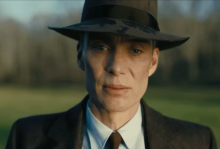
IN CHRISTOPHER NOLAN'S film Oppenheimer, J. Robert Oppenheimer (Cillian Murphy) gives a speech to his assembled Manhattan Project team in Los Alamos, N.M., shortly after the U.S. drops an atomic bomb on Hiroshima, Japan, in early August of 1945. In a small auditorium in this town built for the sole purpose of developing the bomb, Oppenheimer looks over a crowd of ecstatic scientists and their families, who greet him with cheers. Some of them are waving American flags.
As Oppenheimer starts praising the team and what their great achievement means for the U.S., we’re given a window into his internal torment: The background starts to blur and vibrate. We hear a child’s scream. Oppenheimer sees a woman’s face start to flake away. Looking down, a charred human body clings to his leg. Oppenheimer sweats. He swallows. He continues speaking, but it’s clear he’s dissociated from the speech he’s written.